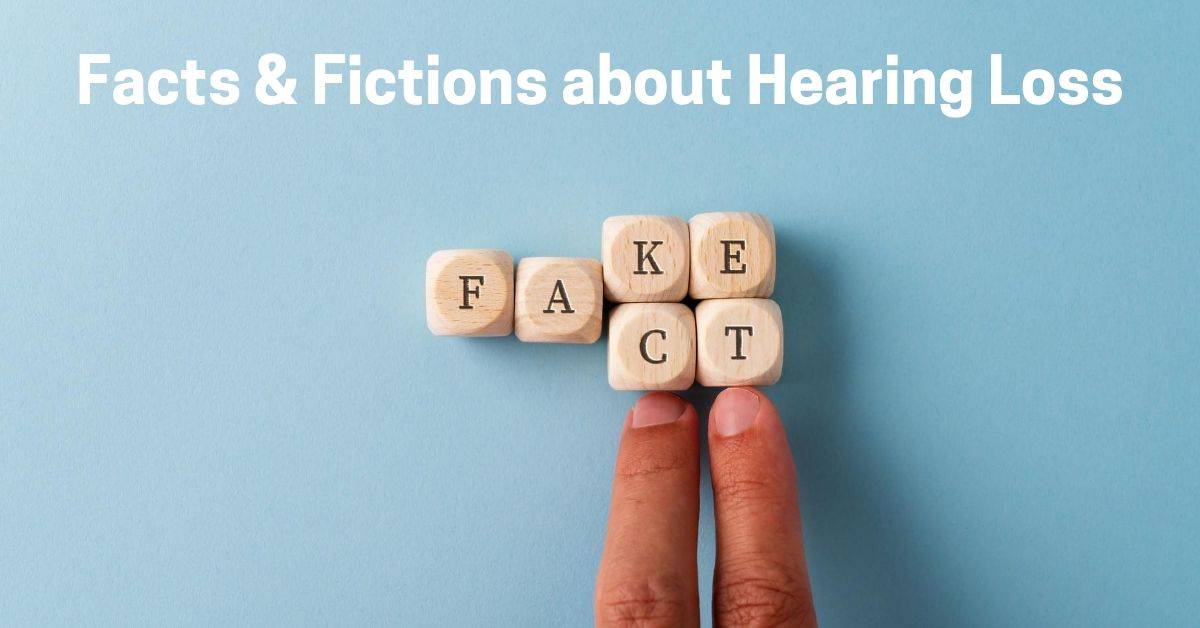Awareness of hearing loss and the issues it can cause is always growing, but most people don’t start thinking about it until long into adulthood when it starts to be problematic. Consequently, myths abound about what hearing loss is and what causes it. Let’s try to clear up a few hearing-loss-related issues and get the facts straight.
Fact: Hearing Loss Is On the Rise
People are suffering from hearing loss at a younger age than ever before. This may be the result of “earbuds,” which allow us to listen to music or other audio on our phones at louder levels than any personal listening device of the past. The prevalence and popularity of music festivals also plays a role. Volume levels in movie theaters have also gone up in recent decades.
While there may be a number of causes coming together at once to create the problem, the fact is that about 20% of teenagers today have measurable hearing loss in one or both ears.
Fiction: Hearing Loss Is 100% Preventable
Wearing earplugs around loud noises is important and young people are suffering from more hearing loss than ever, but even if we do everything we can to protect our hearing over the course of our lives, hearing loss is a natural part of aging that most of us will experience in our later years.
About three quarters of people over age 70 have hearing loss, and among centenarians the rate of hearing loss is nearly 100%. It seems that if we live long enough, we are certain to experience hearing loss.
Fact: Diet Has an Impact on Hearing Health
Recent studies determined that following an anti-inflammatory diet such as the Alternate Mediterranean diet (AMED) or Dietary Approaches to Stop Hypertension (DASH) has a dramatically positive outcome on hearing health. It appears that age-related hearing loss can be slowed effectively by reducing the amount of free radicals in the blood and reducing inflammation, allowing better blood flow to the delicate parts of the inner ear.
Quitting smoking also slows the onset of age-related hearing loss. It seems that many things that have an overall positive effect on our general health are also good for our hearing ability.
Fiction: Hearing Loss Is Annoying but Not a Big Deal
While hearing loss definitely makes life more difficult in little ways, it also causes big changes over time. Those with untreated hearing loss are at greater risk for earlier onset of dementia and Alzheimer’s. They’re also at a much higher risk for loneliness, isolation and depression. Even the ability to balance our bodies on two feet decreases without hearing aids, putting those with untreated hearing loss at a greater risk for physical injury due to falls.
Fact: It’s Better to Get Hearing Aids as Soon as Hearing Loss Is Noticeable
Some people want to put off getting hearing aids until they really can’t hear. While this might make sense from a financial standpoint, the problem is that the brain changes in light of hearing loss. The auditory cortex, where sound is interpreted, will atrophy over time. When a person finally does get hearing aids, they’ve forgotten how to hear. They’ll still have problems understanding what people are saying: not because they can’t hear it, but because their brain can no longer interpret it. It’s for this reason that audiologists will frequently offer “hearing training” sessions for those who are new to hearing aids. It can take months to get reacclimated to hearing the world around them again. Why go through the pain of losing a sense and trying to regain it? Getting hearing aids when hearing loss is first noticed will allow you to go on with life uninterrupted.
If you or a loved one is experiencing hearing loss, make an appointment for a hearing test today. The hearing test is the first step to seeing how your hearing actually compares to what is considered normal, and allows you to start keeping track of your hearing ability over time. Maintaining a healthy diet, quitting smoking, exercising regularly and keeping up a social calendar are all important parts of maintaining your hearing health and general well-being throughout your life. Wherever and whenever you start, get started!

